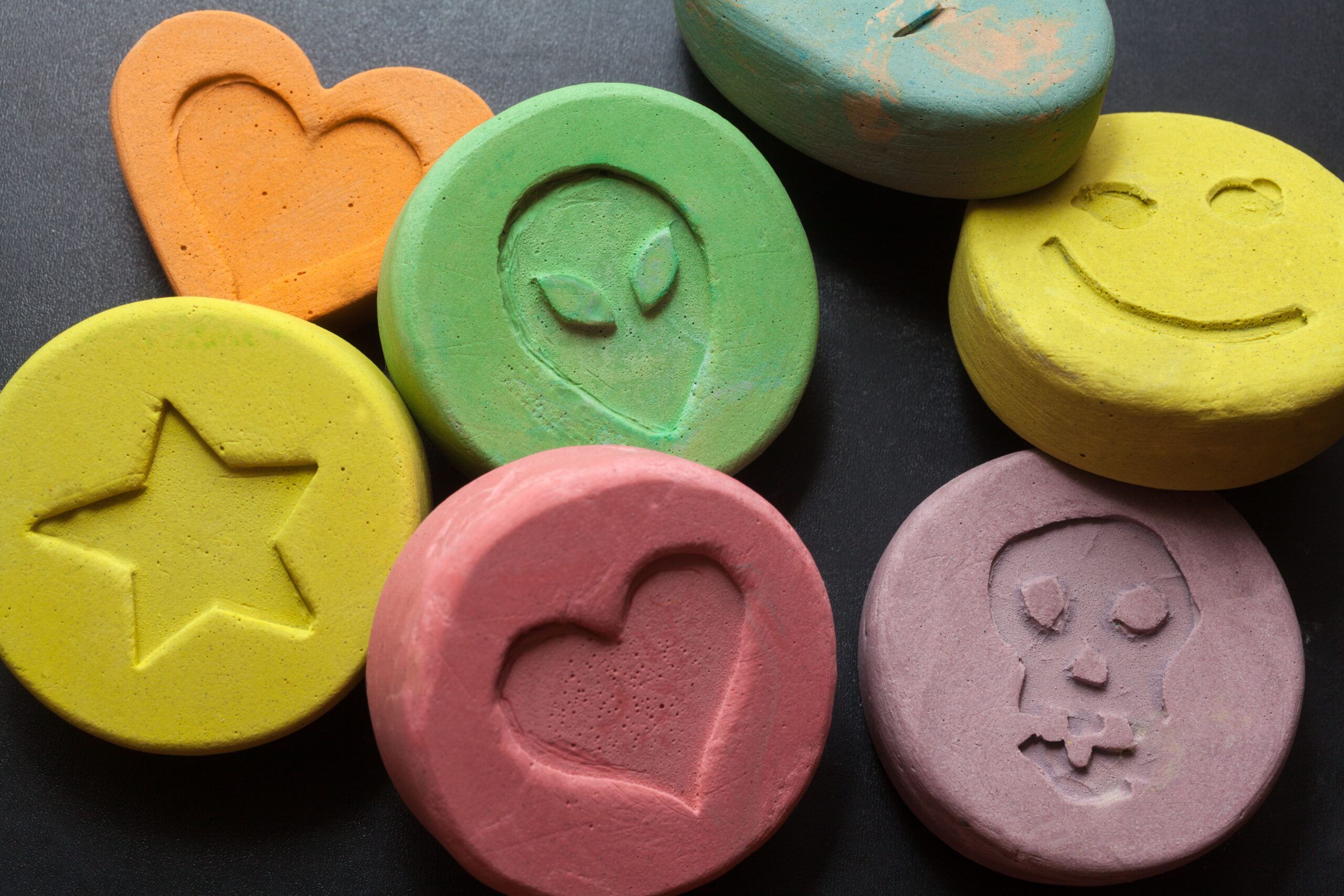
MDMA and Ecstasy are two very different substances. They have some of the same properties, however they carry different dangers and differing effects on the person using them. Both substances contain MDMA, but the most notable difference is that one is a compound containing it, with additives, while the other is in its pure form. Either way, these substances are dangerous.
What is MDMA?
MDMA is a synthetic psychoactive substance that alters mood and perception. It is a stimulant, belonging to the amphetamine drug class. Primarily, this substance affects serotonin levels in the brain, increasing feelings of empathy, euphoria, and sensory stimulation. It is commonly used recreationally due to its mood and social interaction effects. MDMA is a substance commonly found in party scenes, like raves.
What are MDMA’s Short and Long-Term Effects?
Like most substances, this one has short- and long-term effects. Short-term effects can include increased energy, euphoria, enhanced empathy, and reduced inhibitions. Those using this substance can also experience increased socialability and heightened emotions.
Long-term use of this drug can result in serious health complications. Neurotoxicity can occur, leading to memory problems, as well as mood disorders like depression and anxiety. A major effect of this drug includes tolerance and dependence. The risk of addiction to this substance is great, and the impacts can be severe.
Ecstasy: Why it’s Addictive
Ecstasy is a substance that affects the brain and its neurotransmitters. It increases serotonin levels in the brain, resulting in intense euphoria, and pleasure. These effects can contribute to drug-seeking behaviors due to the desire to recreate the pleasure sensation of using this substance. MDMA and ecstasy are similar substances, however, the latter is a compound containing the former.
It is mixed with other substances, such as fentanyl, and pressed into a pill form. These additives can be dangerous, as there is no telling exactly what is used. Additives like amphetamines can lead to further dependence on the substance, as this is also a highly addictive substance.
Risks
Short-term risks of Ecstasy can include dehydration, hyperthermia, increased heart rate, and electrolyte imbalance. Another risk of using this substance is serotonin syndrome. This condition is characterized by agitation, confusion, high body temps, and seizure. It is a life-threatening condition and should be monitored by medical professionals. The way that these substances act upon the body can be extremely impactful, and the risks associated with their use can be deadly.
Short and Long-Term Ecstasy Effects
Both substances have similar short and long-term effects. Similar effects can include increased energy, heightened empathy, emotions, sensory stimulation, and euphoria. Short-term risks include dehydration, hyperthermia, cardiovascular problems, and serotonin syndrome. Long-term effects include cognitive impairment, memory problems, and mental health conditions such as depression and anxiety.
With chronic abuse of this substance, individuals can begin to develop a tolerance to it, requiring higher doses to achieve the desired effects. With continued use, the individual can develop a dependence on it, often requiring professional intervention to overcome it.
Differences Between MDMA and Ecstasy
While MDMA is similar to Ecstasy, they have distinct differences that warrant noting. MDMA is the pure form of 3,4-methylenedioxymethamphetamine. While Ecstasy is a compound of the drug. The compound may consist of caffeine, amphetamines, and other additives that can be detrimental to one’s health.
The pure form usually comes in a crystalline substance. While the compound is a pressed pill. Because it is pure, MDMA does not require additives. However, the other needs them to be pressed into its pill form.
MDMA Withdrawal
Withdrawal from this substance can be difficult. It varies from person to person depending on several factors. These can include frequency of use, dosage, the person’s metabolism, and any pre-existing health concerns. Symptoms of withdrawal can include depression, anxiety, mood swings, and irritability.
Other symptoms can include memory problems, difficulty concentrating, decreased appetite, weight loss, insomnia, headache, and tremors. The effects of withdrawal should be medically monitored to prevent further complications in the individual’s life.
Ecstasy Withdrawal
Those facing withdrawal from this substance also face associated challenges. The entire process can be uncomfortable and unpleasant, and it often requires added support and monitoring to manage the symptoms. The symptoms of withdrawal from MDMA and Ecstasy are similar. Mood disturbances like depression and anxiety may present themselves, as well as fatigue and lack of motivation.
Other symptoms can include insomnia, appetite suppression, weight loss, cognitive impairments, and memory problems. Cravings are a major part of withdrawal that often leads people back to using the substance. Having proper care and support can help these individuals stay the course and maintain a clean and sober lifestyle long term.
Begin Your Recovery Journey Today
Substance abuse is a challenge that many people face daily. It is a struggle that affects the lives of thousands of Americans, impacting their physical and mental health, as well as their personal and social lives. If you or a loved one are struggling, there is help available. At Empowered Recovery Center in Atlanta we offer comprehensive treatment for individuals facing the challenge of substance abuse and addiction.
Our rehab center in Atlanta offers several addiction treatment programs with various levels of intensity so you can find the right program that fits your needs. From the first phone call to treatment and aftercare, our rehab admissions team can help you find the program you need and support you during your recovery. Contact us today to learn more about paying for addiction treatment, using insurance to cover rehab, verifying your insurance, and more.
Program Links
Check Your Insurance Benefits
Empowered Recovery Center is dedicated to providing addiction treatment services to the greater Atlanta area including Acworth, Alpharetta, Canton, Cartersville, Kennesaw, Marietta, Powder Springs, Sandy Springs, and more.
Resources
Connect With Us
-
Empowered Recovery Center
3651 Canton Road,
Marietta, GA 30066
